Fort Wayne Bat Removal
Welcome to Fort Wayne Bat Removal! We are Indiana bat removal specialists. It is important to know that bats are protected by Indiana law, and are beneficial animals to have in the environment. We do not kill any bats during our bat removal process. Never hire a pest control company or anyone who says they are a Fort Wayne bat exterminator. For correct and effective bat removal, you want a company that specializes in humane bat colony extraction. Our process is not only the only legal method in Indiana, but it is the most effective. We have a 100% success rate in our bat control process. We perform our industry-best 32-point inspection of your house or building, and seal shut all bat entry holes down to 1/4 inch as part of the removal process, during which we remove the colony via special one-way exclusion devices specific to your architecture. Once all bats are safely out, we permanenetly bat-proof the structure. We also provide guano (bat droppings) removal and decon. Click on our Fort Wayne Bat Control Prices page to find out more about our prices for bat control work. We work 24/7/365, and would love to talk to you about your bat problem. Call us any time at 260-232-0282 to discuss it, discuss our pricing, and if you wish, set up an appointment at your convenience, often same-day.
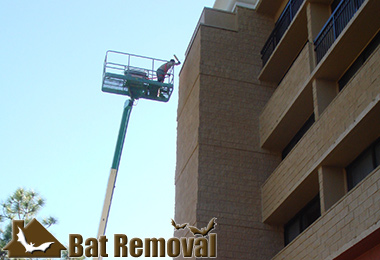
Fort Wayne Building and Attic Inspections

No-kill Indiana Bat Extraction
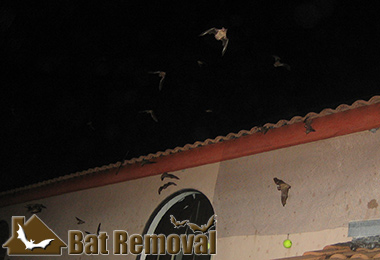
Guano Cleanouts - Serving all of Indiana
Call 24/7 to discuss your bat problem.
Same-day or next-day appointments.
32-point inspection of your property.
Written estimates for bat removal project.
Fully state licensed and insured.
Residential and commercial service
100% no-kill Fort Wayne bat extraction
Complete bat-proofing of your building
Compliance with all Indiana, federal laws
Guano removal and attic decontamination
Our Service Range - 260-232-0282
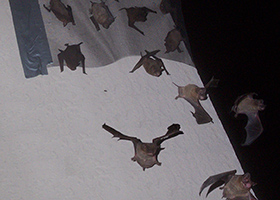
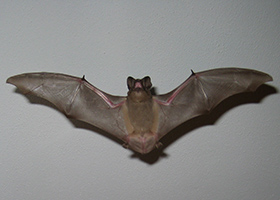
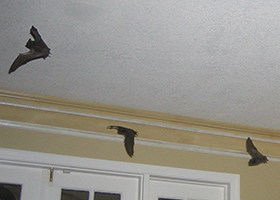
4 Symptoms of a Sick Bat
Most of the bats that you will encounter will be healthy. However, like humans, bats can also get sick. Some of the illnesses that can affect them can be transmitted to humans. Therefore, it is essential that you know how to determine the sickness just by looking at the symptoms of the bats. Once you notice some alarming signs, call the assistance of the wildlife rehabilitators to minimize the risk to public health.
Signs and Symptoms of a Sick Bat
We highly discourage people on dealing with bat problems on their own especially if they lack the knowledge and skills to do it. If your work requires you to be in contact with the bats and their habitat, be sure that you will be properly vaccinated. You should also be armed with protective gears.
1. White Fungus
The white fungus on the nose of the bat can be a sign that they are infected with the disease known as WNS (White-Nose Syndrome). This illness was first reported in Maryland in the year 2010. During that survey, around 200 bats have been diagnosed positive with the disease. You will often notice the white fungus on the muzzle of the bats. The disease has claimed around 6 million bats in the US alone. According to the experts, some species of bats that are heavily affected with the disease has suffered at least 90 percent decline in their population.
2. Flying Difficulty
Bat is the only mammal that is capable of true flight. If you notice that they are having trouble in flying, there can be different reasons behind it. They can be dehydrated, injured, or sick. If the bat has been kept inside the cage for too long, the reserve energy of the bat will deplete that will make it difficult for them to fly. When looking for any sign of sickness or injury, be sure to wear gloves and facemask. You should also allow the experts to nurse them and keep your children and pets away from the bat.
3. Aggression
Bats are docile creatures and will not attack humans. Bats are afraid of us and will rather flee than to confront the dangers. However, if they are showing an odd aggressive behavior, this can possibly be a sign of a rabid bat. The rabies virus can affect the central nervous system of the host that affects their behavior. Rabies can be transmitted through the bite or scratches of the infected animal. Once the symptoms manifest, it'll be impossible to cure them.
4. Being Active at Daytime
Bats may remain active in the morning due to a range of reasons. They are probably looking for more food that will allow them to build their body fats. Bats can also be active on areas with less predators. However, a bat out on a daylight can be a sign of the rabies virus. Pay attention to the other signs such as being lethargic, excessive drooling, foaming in the mouth, etc. to understand if they are infected.
Once you notice these signs on the bats, it is recommended to stay away from them and call the help of the professionals. Some diseases that they carry can be fatal if not treated appropriately.

